Meet some of the community organisations who are members of the network
OCD-UK |
|---|
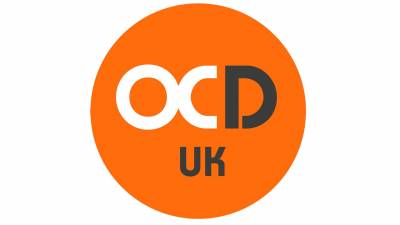
OCD-UK has been working for those affected by Obsessive-Compulsive Disorder (OCD) since 2004 and uniquely the charity is completely service-user led, including Chief Executive Ashley Fulwood who talked about his own experiences:
“As somebody that continues to suffer with OCD the impact on my social interactions has been profound, to the extent that loneliness and social isolation have come as a consequence of suffering from OCD.”
This was something the charity explored at a recent conference where there was overwhelming sense of lost opportunities in life, most significantly through relationships - friendships and romantically, which leads to a sense of loneliness for many adults with OCD.
For this reason, OCD-UK were supportive of the research led by Dr Josie Millar and funded by LSIMHRN to explore the often overlooked collateral damage of OCD and how that may also have an impact on worsening of OCD symptoms. The research was collaborative with involvement of service-users through every stage of the research, culminating in a presentation at the charity’s annual conference in November.
Josie, OCD-UK and their team hope the learnings from this research will help inform and shape future charity projects and research which leads to better outcomes for those whose OCD has left them feeling isolated and alone.
For further information about Obsessive-Compulsive Disorder (OCD) please visit: https://www.ocduk.org
Opening Doors London |
|---|
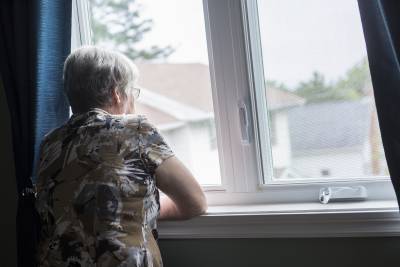
Opening Doors is the only national charity dedicated to providing services to LGBTQ+ people over 50, including activities, events, support and information. They also provide accredited training to professionals, conduct research, and create policy. They have a membership of nearly 2,500 older LGBTQ+ people and work across the UK while retaining a focus in London.
In a recent collaborative study funded by LSIMHRN, UCL and Opening Doors explored the relationship between loneliness and depression in older LGB adults. They know many of their members experienced both loneliness and depression and were keen to be involved in the study. They felt they could contribute to the research particularly by interpreting the results through their lived experience and disseminating the results through their networks.
The research has strengthened the evidence-base for staff to carry out their work around older LGBTQ+ people who experience loneliness as well as improving their needs assessment for both face-to- face and telephone befriending, and appropriate signposting for those feeling depressed or suicidal. It has raised awareness about mental health, and the links between loneliness and depression among both members and volunteers. The study has helped shape their monthly social activities, evaluating how positive relationships, companionship and networking helps to reduce loneliness and isolation, improving peoples’ health and wellbeing.
Watch Opening Doors London’s promotional video on YouTube.
Find ODL on Facebook
Follow ODL on Twitter
Follow ODL on Instagram
Shaping Our Lives |
|---|
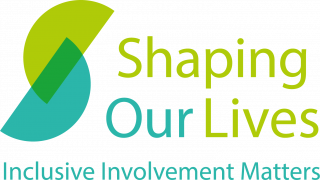
Shaping Our Lives is a non-profit making user-led organisation specialising in the inclusive involvement of disabled people and people from other marginalised communities. Involvement activities enable people to have a say in policies and services that affect their lives, and can have a positive impact on mental wellbeing. When involvement is truly inclusive, it can empower service users to harness their valuable lived experience to create better services for everyone. Sign up for their bulletins for monthly updates.
MindOut |
|---|

MindOut is a mental health charity run by and for lesbian, gay, bisexual, trans and queer people. They work to improve the mental health and wellbeing of all LGBTQ communities and to make mental health a community concern. This includes advice, information, advocacy, peer support groups, peer mentoring, suicide prevention, counselling and out of hours online support. They also work with groups within LGBTQ communities who may be particularly at risk of social isolation and poor mental health, such as those who are over 50, migrants, people of colour, people who are homeless, or those with substance misuse issues.
MindOut is the community partner in LSIMHRN-funded Plus Project “Pathways between LGBTQ migration, social isolation and mental distress: The temporal-relational-spatial experiences of LGBTQ mental health service-users”., which is led by Zoë Boden-Stuart from the Univeristy of Brighton. Service-users from MindOut, as well as the CEO, have been part of the project steering committee and MindOut have supported the recruitment of research participants.
Friends for Good |
|---|
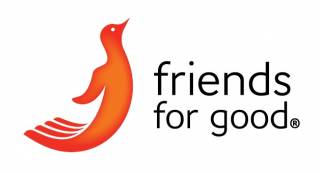
Friends for Good is an Australian not-for-profit organisation that focuses on loneliness and social isolation. It was founded in 2016 as a response to a significant gap in services and awareness. The core service of Friends for Good is FriendLine, which is a free, anonymous phone service available for anyone in the community who feels isolated, lonely or wants to reconnect. The recent Quarterly Evaluation of the service suggests that 97% of callers find talking to a volunteer on FriendLine reduces their feelings of loneliness. Friends for Good also undertakes community-based research, chairs The Friendship Alliance and hosts Conferences and Symposiums to bring together academics and community organisations to discuss the issues of loneliness and social isolation.
For more information about Friends for Good contact admin@friendsforgood.org.au or visit the website www.friendsforgood.org.au.
Happity |
|---|

Happity is the UK's biggest platform dedicated exclusively to baby and toddler groups and classes. It helps soon-to-be, new, and seasoned parents access thousands of online and in-person classes across the country, allowing them to gain knowledge and join and build communities to support their mental wellbeing. They give particular focus to helping new parents address postnatal depression, loneliness, and social isolation by providing resources, speaking in the media, raising charity funds, and hosting and speaking at events.
Happity Co-founder Emily Tredget is a member of the Songs from Home project team and will provide a direct link between the researchers and new mothers in creating and testing an online songwriting programme to reduce symptoms of loneliness and postnatal depression. This collaboration will be key in recruiting a diverse group of new mothers experiencing these mental health struggles from across the country, as well as bringing Happity’s extensive experience in fostering online classes and communities to developing a music-based approach that is as effective and inclusive as possible.
Email: hello@happity.co.uk
Twitter: @HappityApp
Men's Sheds |
|---|
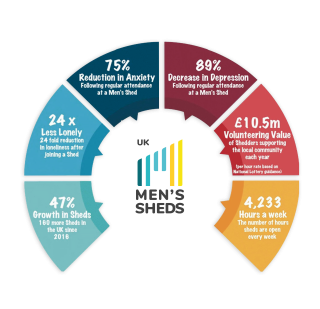
Men’s Sheds are similar to garden sheds—a space to pursue practical interests at leisure, to practise skills and enjoy making and mending. The difference is that garden sheds are often solitary, while Men’s Sheds are about social connections, friendship-building, sharing skills and knowledge. Their motto is ‘Healthy and Happy Men, their mission is to enable access to a Men’s Shed for every man that would benefit from one and they won’t stop until they’ve achieved it! UK Men's Shed Association is the charity that supports the day-to-day running of Sheds. For a detailed description see their website.
UKMSA is part of one of the Interventions Plus Projects funded by LSIMHRN and led by Bryony Porter from University of East Anglia. In this research project, UKMSA have helped connect the project planning and development to the wider network of Sheds. The research team shares project updates through the UKMSA Newsletter (Shoulder-to-Shoulder) and social media and UKMSA have introduced the project to many Shedders who have now signed up and participated in the project.
Dance Base |
|---|
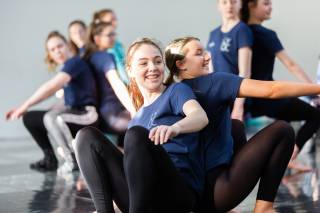
Dance Base is Scotland’s National Centre for Dance, existing to encourage and celebrate the potential for dance in everyone. They are keen to ensure as many people as possible can experience the benefits of dance to improve health and wellbeing, and that as many artists as possible are able to deliver this work. They are delighted to be a partner on one of the six projects funded by LSIMHRN as part of the Interventions Plus Project funding call. Dance Base will be working with with Katey Warran, Laura Wright, Dr Karen Mak and Saoirse Finn, to interrogate how an online group dance intervention can support the wellbeing of young people living with anxiety; this research will deepen their understanding of why and how online classes may be beneficial and help them to develop their work in the area of Dance Health. They moved their programme of dance classes online as a response to lockdown, with drop-ins and courses for people of all ages. Their digital programme includes inclusive and creative dance activities for people with Parkinson’s and their families, and their ‘Feel Like Dancing’ resource includes seated classes for individual use and in residential settings. These online classes have been accessed thousands of times, with anecdotal evidence noting a reduction in loneliness and an increase in mental wellbeing.
For more information, please contact the Dance Base team on dance@dancebase.co.uk, via our website https://www.dancebase.co.uk/, or social media https://www.facebook.com/DanceBaseScotland/.
Mental Health Collective #KindnessByPost |
|---|
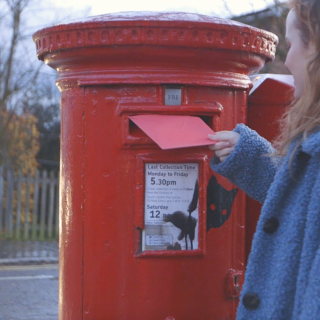
At the Mental Health Collective, they’re focussed on finding new ways of coming together and unlocking the often overlooked potential of social and collective approaches to mental health.
Coming together means connecting with other people and reminding ourselves that we aren’t on our own in the world. Their flagship project #KindnessByPost sets out to remind participants of just this, by encouraging people to share cards or letters with messages of good-will with a stranger, and allocating another stranger to send them a card too (secret Santa style).
Their exchanges have really taken off since national COVID-19 lockdowns began. Over 10,000 people have taken part so far, and people have been in touch to tell them that participating has made them feel less afraid of strangers. People have joined in from every single county in England, Scotland, Wales and Northern Ireland.
Each time they run an exchange, they’re overwhelmed by the community feedback. It’s clear to the small team behind #KindnessByPost that something special is happening here, and that a movement is building. What they’re not yet clear on, is the long term impacts on people's wellbeing, perceptions and behaviours that #KindnessByPost could be having. By working with a team funded by the LSIMHRN and led by Luke Sheridan-Rains, they hope to capture and evidence these important dimensions of impact, to better understand theirr project and what could be making participating such a meaningful experience for people.
For more information visit kindnessbypost.org or contact amy@mentalhealthcollective.org.uk
Trust Links |
|---|
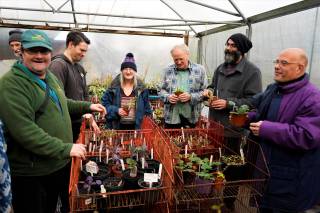
For members attending any one of the four Trust Links gardens in South Essex, the team of support workers and volunteers help to bring members together to form a valuable peer-support network. In doing this, not only are members able to leave home to connect with likeminded individuals and form lasting friendships, they also have the opportunity to learn a range of valuable skills, build confidence and get exercise in a fun and inclusive environment.
With their trained, friendly team on hand for support, members also benefit from regular wellbeing support calls when they are unable to attend the gardens. This has proved to be an essential and valued service in reducing loneliness and social-isolation, particularly during the coronavirus pandemic.
One member shared: “I felt very isolated and lonely. I had nowhere to go to meet people. I felt I had no support. Thank you because all of that has changed.”
Trust Links is the community partner in one of the 6 Interventions Plus Projects funded by the LSIMHRN. The research project is led by Dr Carly Wood at the University of Essex and will explore the impact of community gardening on loneliness and wellbeing in individuals with mental health problems; and the barriers and facilitators to use and prescription.
For more information about Trust Links please contact chiefexec@trustlinks.org and visit www.trustlinks.org. For information about the research project please contact cjwood@essex.ac.uk.
Glasgow Association for Mental Health |
|---|
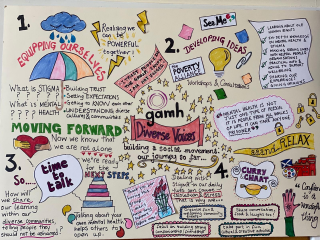
GAMH are co-investigators on one of the six projects funded by LSIMHRN as part of the Interventions Plus Project funding call, which is led by Manuela Barreto from the University of Exeter. The research project is aimed at investigating the impact of such a community-based peer-group on loneliness and mental health, and to understand what aspects of the community intervention make a difference. From March 2021, with funding from The National Lottery, group activities for young people will be delivered as part of a Young Adult Wellbeing Service and the LSIMHRN-funded research project will be embedded within the service, with a research assistant based in GAMH working alongside service staff to support recruitment to the research, administer questionnaires and conduct qualitative interviews with young adults and focus groups with staff.
For more information on GAMH, please contact:
- Yu Wei Chua, Research and Development, Young Peoples Service (y.chua@gamh.org.uk)
- Rena Ali, Manager, Young Peoples Service (r.ali@gamh.org.uk)
Image: Young people in the groups share their thoughts about mental health stigma and discrimination in the "Diverse Voices" consultation.
42nd Street |
|---|
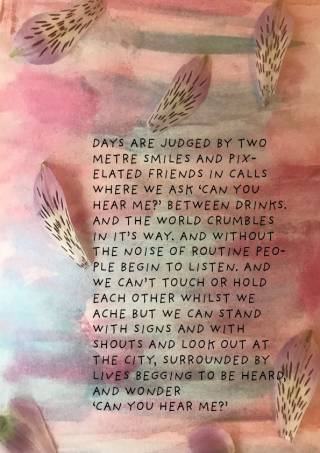
42nd Street is an innovative Greater Manchester young people’s mental health charity with 40 years’ experience of providing free and confidential services to young people who are experiencing difficulties with their mental health and emotional wellbeing.
Connection and disconnection have been at their starkest over the past 8 months for us all. One of 42nd Street's most successful engagements with young people over this time has been through the LSIMHRN-funded Pathways Plus Project Left on Read, which is led by James Duggan at Manchester Metropolitan University. Left on Read is about co-producing creative encounters to help young people explore loneliness, isolation and mental health issues during COVID-19 lockdown/physical distancing. You can read more about this research project on the LSIMHRN website, as well as see James talk about his experiences of applying for the funding as an early career researcher.
42nd Street's creative producer, Rodd Kippen, writes: "The group [involved in the research], though having never met in person, have found common ground in their thoughts on how we can support others, how creativity plays a part in mental health and what social change needs to occur. They have been able to talk though ideas, develop their thinking by having time to discuss ideas with each other and from the input of academics and artists. They are looking to create some truly unique ways to help us feel connected in this connected/disconnected world."
The Farming Community Network (FCN) |
|---|
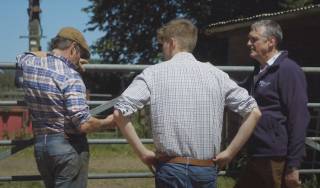
The Farming Community Network (FCN) is a national charity providing practical and pastoral support to farming families in England and Wales. Through its 400 volunteers and its national Helpline (03000 111 999), FCN provides an important service to the farming community. Many cases presenting to FCN contain a mental health component, which can be exacerbated by issues such as financial difficulties, relationship problems and fears and uncertainties around the future.
FCN is collaborating with academics from the University of Exeter as part of a Network-funded Pathways Plus Project led Professor Matt Lobley and Dr Rebecca Wheeler. This research will use a series of qualitative interviews to explore how social isolation, loneliness and mental health issues within the farming community are experienced and managed – and how to improve support available.
Together Co |
|---|
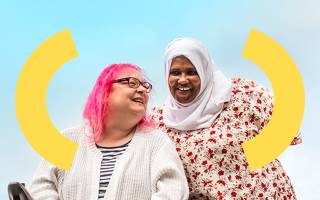
Together Co Befriending, is their well-established good neighbour befriending service that supports older people, and homebound people experiencing physical and mental health difficulties. The Together Co Social Prescribing Service works with Primary Care/PCNs across Brighton & Hove to deliver person centred, holistic and asset-based link worker interventions that connect individuals with the people, places and activities they need to be happier and healthier. Both services host funded collaborations with LGBT, BAME and community development organisations to explore and expand the accessibility and inclusivity of our services.
Please contact Sofie Franzen, Deputy Chief Officer, for further information on collaborating with their organisation on a research project: sofie.franzen@togetherco.org.uk.
Outside Edge |
|---|
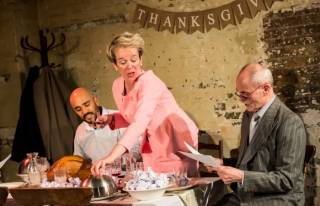
Founded by Phil Fox, who was an actor and recovering heroin addict, the work of the company builds from Phil’s own experience of theatre leading from addiction to recovery.
We support people affected by substance misuse in a peer lead environment, encouraging them to reach and recognise their potential, build skills and confidence. We believe that by creating a space for those affected by addiction to play, build friendships and engage in group drama exercises, we can reduce the isolation attributed to addiction negatively affecting our participant’s well being and mental health. We are interested in speaking to anyone researching addiction in reference to loneliness/social exclusion, or those who have a transferable evaluation framework to monitor the impact of the arts on loneliness: admin@edgetc.org
Bromley by Bow Centre |
|---|
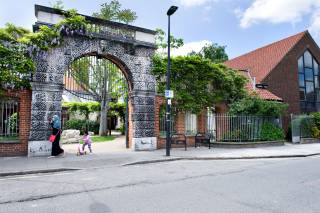
In partnership with Public Health England, the Wellcome Trust and the Health Foundation, they have embarked on a robust multiyear embedded research and evaluation programme that will create a deeper understanding of the effectiveness of the Bromley by Bow Centre’s holistic approach. They are keen to continue this work in order to facilitate student teaching, inform policy and practice related to tackling long standing health inequalities in deprived communities across the country through our knowledge share programme. All of this work is underpinned with the ambition of building resilience and resourcefulness though connections between individuals, groups, communities and services.
If you are interested in learning more, or visiting the centre contact the insights team by emailing insights@bbbc.org.uk or giving them a call on 020 8709 9741.
The Archway Foundation |
|---|
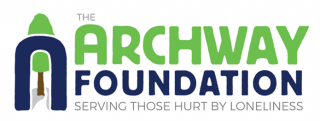
If you are interested in learning more, please look at Archway’s website, email office@archwayfoundation.org.uk or call 01865 790552.
Independent Age |
|---|
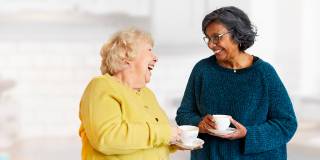
Lambeth Vocational Services |
|---|
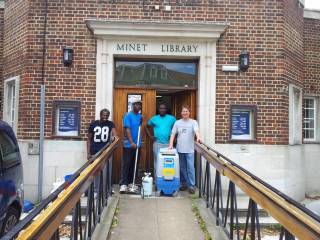
Our learning tells us that the antidote to isolation is to feel socially included. Our mission is to help people work with their own experience, to find their own way forward, in a process of learning, change and growth. People have consistently described a range of validating conditions that make this happen. We have also developed a work training model. This is where public sector procurement is used as a catalyst to address the social inclusion agenda and increase social value. Significant funding can be obtained by facilitating industrial type commercial activity that creates opportunities to undertake paid work. This makes ethical and economic sense, and this innovation has the potential to be scaled significantly.
Please contact Mark for further information or the Service Finder webpage.
The Proud Trust |
|---|
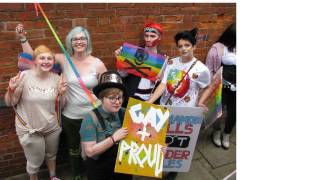
Loneliness, often coupled with isolation, has always been a concern for LGBT+ communities. LGBTphobia is a significant contributor to loneliness. The Proud Trust work to find different ways to develop options for LGBT+ young people to feel better connected and valued. The mantra of Rita Mae Brown, ‘Happiness is pretty simple: someone to love, something to do, something to look forward to’, is a key message in their work to address the social, emotional and existential features of loneliness: they build their work around the key themes of Connect, Communicate, Create and Critically think. The Proud Trust are also conscious of developing safer staff, safer peers, safer spaces and safer activities to enable their work to reach and enhance a broad range of LGBT+ young people’s lives.
The Proud Trust is always keen to discuss collaborative research with academics to further enhance understand of how they can better serve the young people they support by addressing loneliness. Please contact Sally Carr MBE for further information.
Youth Cymru |
|---|
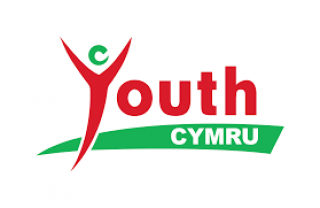
Young people have been participating in creative workshops, while developing their own social action projects to address loneliness within their communities. These social action projects are youth lead and run, with the young people identifying something in their communities that is affected by youth loneliness.
To support this work we have created a free toolkit, available in English and Welsh from project lead Kirstie. For more information get in touch via kirstie@youthcymru.org.uk.
North Tyneside Art Studio |
|---|
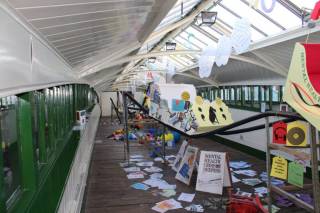
Whilst the positive impact of art and creativity on mental health is now well established, more than 50% of the people joining the studio cite loneliness or social isolation as one of the main reasons for coming to the Studio. It is the friends found and friendships formed and strong sense of community that make the Studio such a special place and such an important lifeline for people. For more information please contact paul.ntartstudio@gmail.com
My Life My Choice |
|---|
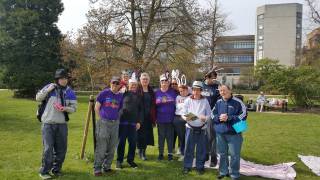
Two of their main focuses are reducing social isolation in order to improve people’s mental health and wellbeing, and in conducting user-led research. As such, they run a project, Gig Buddies, which pairs up a volunteer with someone with similar interests who is struggling to get out so that they can go and do fun things together. They also run a user-led research enterprise in which adults with learning disabilities work with academics to conduct research into topics that affect and interest them, such as relationships, the First World War, and health and social care.
Wavelength |
|---|
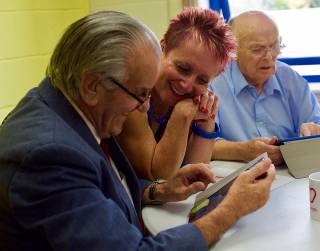
Movember |
|---|
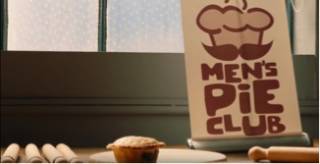
Shallal |
|---|
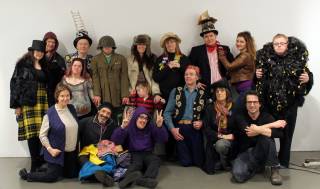
Shallal is an inclusive charity based in Cornwall providing high quality dance, movement, performance, arts and film/digital opportunities for the community including people with mental health issues, physical and learning disabilities, people who are disadvantaged, socially excluded and isolated. For over 20 years Shallal has championed excellence in inclusive arts for all people whatever age, background or ability.
Battle Scars |
|---|
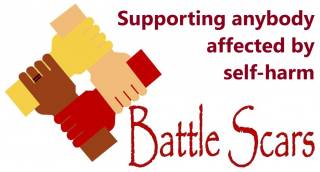
Battle Scars provide UK-wide virtual support to adults struggling with self-harm (from pulling hair to cutting, from overdosing to eating disorders), to their families and to the professionals who support them. When “normality” returns they will once again provide face-to-face support to adults in Leeds and Wakefield and to children in Leeds. Everything they do is peer support and they are 100% survivor-led and run. Their aim is to create safe spaces where everyone is accepted as they are so they can explore their behaviour, learn, raise their self-awareness and find ways to manage it. Nobody has to fight alone. Battle Scars provide UK-wide virtual support to adults struggling with self-harm (from pulling hair to cutting, from overdosing to eating disorders), to their families and to the professionals who support them. When “normality” returns they will once again provide face-to-face support to adults in Leeds and Wakefield and to children in Leeds. Everything they do is peer support and they are 100% survivor-led and run. Their aim is to create safe spaces where everyone is accepted as they are so they can explore their behaviour, learn, raise their self-awareness and find ways to manage it. Nobody has to fight alone.
361 Life Support |
|---|
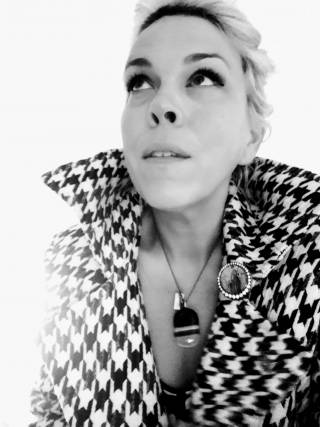
Their 3 main goals are:
- To provide emotional education for abused women and for society
- To facilitate mental health recovery by helping survivors to reframe their stories to give their experience value
- To provide opportunities for survivors to reconnect to society in a meaningful way
 Close
Close

